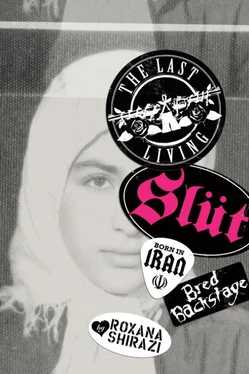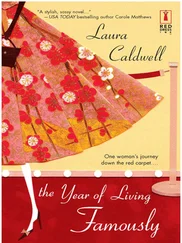We sat on the curb so Anneh could rest and catch her breath.
“You stay here while I go find the plane.” My voice sounded oddly grown up to me, even though I was terrified. I didn’t know what to do. Her face was ashen. I dashed back into the terminal. Inside, I desperately tried to find a friendly face to ask about this wonderful place called “gate three.” No luck.
I ran back outside. Anneh looked even worse. Dread froze my throat. Her cushioned cheeks were purple. A choking whistle mixed with a wet crackling sound came out of her mouth. She fought to breathe. Her wide eyes pleaded with me to help her. I was desperate and unable to communicate with anyone. At that moment, I deeply regretted skipping all those private English classes my parents had arranged. My grandmother couldn’t breathe. She was dying right before my eyes and no one else could see it.
Again I ran into the terminal to get help. Again, my frantic jabbering drew only blank stares. When I ran back outside, an ambulance was parked by my grandmother, and a policewoman was helping her to her feet. I loved that policewoman so much at that moment.
I remember climbing into the ambulance, and then… nothingness.
Even now, no matter how much I stretch my brain, I cannot remember what happened from the moment I climbed into the ambulance until I woke up the next morning in the hospital. It’s as if those few hours have been wiped from my memory forever. The next thing I knew, I was awake in a hospital room and my uncles were at my grandmother’s bedside.
A few days later, my uncles drove my grandmother and me to Manchester. The August weather was cloudy and drab—always gray, still, and vacuous. The thick syrup smell of the local brewery seeped into the city each afternoon when my aunt took me to the laundromat and into town to buy strawberries, which had been a rare treat in Iran during the war.
We moved in with my uncle and aunt into Cooper House, a concrete tower of public housing that still sits red and stubborn on the curve of Boundary Lane in Hulme, Manchester, its stairways full of bloodied sanitary towels, full of story. That tower will probably always be there, no matter what happens in the world. It is the cockroach of apartment buildings. To me it will always also be full of my grandmother: her history, her brilliant light, her soul, her hair the color of honey, her bad eyesight I once made fun of.
I will never forget dancing around the grounds in my red rah-rah skirt, the one I wore to make me feel more alive. I’d put it on and skip through the stairwells in Cooper House, all the way from number twenty-eight, where we lived, to my friend’s place at number eighteen. And all the while, in the marble of my eye, I saw the beautiful patterns of the carpets in our house in Iran. The rich tapestry of maroons and purples by the doorway in the main front room, in the courtyard by the fishpond, and in our garden of pomegranate tree and roses. And every day, my grandmother was slowly dying.
My uncle and aunt had escaped to England via Turkey. Since they had just started to make a life for themselves in this new world—with a new baby—there was no money and very little food. The flat was tiny. I felt imprisoned, so far from the existence I had left behind. I wanted my family and my dolls. But my main concern was finding something to eat. Every day, my grandmother and I were starving.
“If you look on the ground as you walk around town, you’re bound to find a penny here and there,” my uncle suggested. “Those pennies will add up and you can buy yourself a chocolate bar.”
So I began watching the ground meticulously whenever I walked outside.
In the afternoons while my aunt and uncle rested, my grandmother and I snuck into the kitchen to look for white bread or rice to fill us up. One glorious night, when Anneh returned from one of her many visits to the hospital, she brought back a handful of pears. That night, after the lights were switched off, we lay in our tiny room in the dark, me on the floor, my grandmother on the bed, eating our pears and laughing with joy, as if we were drunk. I felt like a princess that night.
Still, the ghostly pock-hollowed soul of this new world surrounded me, and I had no idea where to go or what to do. Every night I dreamed of Iran. The dreams were so vivid that, when I woke up, I was shocked to find myself on a strange floor looking out at the same tall gray buildings. One night I dreamed about all my friends playing by a sunny lake. We picked fruit from the trees, and I flirted with Babak, a boy from my Iranian school whom I’d had a major crush on. He had a smooth, tanned body. He flirted back. It was nice to see his face; I felt like I was there, until I woke up suddenly. When I realized I was actually in England, I felt sick and terrifyingly alone.
Every morning when I awoke, I would hear the khut khut khut of the sewing machine on which my aunt and uncle made their illegal bread and butter. A short Pakistani man named Ismail, with a head as hairy as a boar, brought denim pieces in all shapes and sizes to the house each day. The two of them would cut, sew, stitch, trim, and iron zippers, buttons, and pockets by a yellow lamp well into the night. The more jeans they made, the more cash they received. Sometimes I would help. I had to be a good girl so the grownups would be happy with me.
Not long after landing in Manchester, I was sent to a local school in Hulme to learn English. I really wanted to be able to talk to other kids, but the first English words I learned, naturally, were swear words. “Fuck” was the first one, “hell” the second. Every day after classes I went to the big library in the town center to listen to language cassettes and read phrase books. I started writing poetry and songs about my time in England and keeping a diary about my experiences.
All this time, my grandmother was dispatched to the hospital every few days with asthma attacks that choked her throat. Eventually, my uncles tired of looking after her, and dumped her in a Cooper House flat to live by herself. I don’t know how she remained so sunny and optimistic. She had come to England for me and she wasn’t going to let her granddaughter down, even if it meant she could barely breathe.
I wrote letter after letter begging my mother to let me come back home, telling her how much I missed my family and friends, explaining how scary it was to walk by the kids in gangs every time I went to shop for bread. I wondered why my mother had sent me here. In Iran, at least, we had enjoyed the luxury of food.
Fuckin’ Paki, She ain’t No Brit! Skin is Brown and She Smells like Shit.
Iturned to books and writing to escape my life in England. I had brought over all my favorites in their Persian translation. Huckleberry Finn kept me full of passion, and I devoured stacks of novels by Iranian writers: political fairy tales about the inequalities of the rich and poor, stories of wild women with unfathomable beauty, unrequited love, wicked stepparents, and one about a princess who fell in love with a bald, penniless pigeon keeper.
After a few months, my uncle decided to send me away from the squalor of our public housing to a more refined environment deep in the southern countryside to begin the process of Anglifying me. Somehow they’d discovered a charitable English family willing to provide me with food and shelter. So off I went to live with the Carsons in their little stone cottage and attend Long Acre School. The Carsons were old-school hippies who found the idea of an Iranian girl fresh from the ravages of war gorgeously exotic and über-trendy. They took me off my uncle’s hands without hesitation.
Читать дальше












